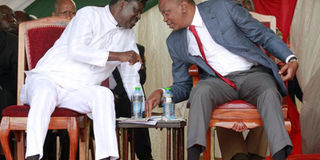5 key questions on Kenya's repeat presidential election

Raila Odinga and Uhuru Kenyatta. They have failed to agree on reforms ahead of repeat election. PHOTO | FILE | NATION MEDIA GROUP
What you need to know:
Will the election be credible?
This is the $100 million question — the steep amount budgeted for the poll.
With Odinga boycotting, and Kenyatta alone on the ballot with five smaller candidates, he is assured victory.
Kenyans head to the polls next Thursday for a second time this year after the Supreme Court overturned the August election victory of President Uhuru Kenyatta.
But with just a week left, fears are soaring of yet another flawed vote and its potential implications for the country.
Opposition leader Raila Odinga has refused to participate and the country's election commission is divided and in turmoil.
Here are the key questions:
Will there be an election on October 26?
As of now, yes.
But what it will look like is anyone's guess.
The 2017 presidential election has seen many twists and turns, and the run-up to election day has been marked by near-daily bombshells that have only led to more confusion.
On Wednesday, Independent Electoral and Boundaries Commission (IEBC) chief Wafula Chebukati said from a technical and logistical point of view preparations to hold the poll are on track.
However, in a statement lambasting leaders and his staff for interference in the election, he raised doubts that the political environment was conducive for voters to exercise their rights.
'NO ELECTION'
Nic Cheeseman, a professor of African politics at the University of Birmingham in central England, said Kenya was facing a "really dangerous situation" with few solutions.
While Odinga announced he would not take part, his name is still officially on the ballot paper, along with Kenyatta and seven other candidates.
He has vowed there will be "no election" and called for mass protests but it is unclear to what extent he plans to, or is able to, disrupt the vote.
Chebukati has called for talks between Kenyatta and Odinga to quash tensions, however Cheeseman said it was "very hard" to see what a political deal would look like at this stage or how it could benefit either candidate.
What does Odinga want?
He is demanding a free and fair election in the aim of finally becoming president: two things he says go hand-in-hand.
The 72-year-old flag-bearer for the National Super Alliance (Nasa) believes the August 8 election was rigged, causing him to lose what was widely seen as his last shot at the presidency after three previous failed efforts.
To the shock of many, he won a Supreme Court petition on September 1 to have President Uhuru Kenyatta's victory overturned.
However after accusing the IEBC of failing to make the vital reforms he demanded, he pulled out of the race — a move he argued would legally force the commission to begin the whole election again from scratch, leaving more time for reforms.
This gamble appears to have failed.
"He just didn't have a good set of options in the first place," said Cheeseman.
"He and Kenya were sleepwalking into another election that was going to be poor quality that he was probably going to lose."
Cheeseman said that in a way, him choosing the "nuclear option" was better than failing at yet another election, further cementing his reputation in some quarters as the "perennial political loser" of Kenyan politics.
What does Kenyatta want?
He has insisted the election take place, with or without Odinga.
The 55-year-old son of Kenya's first president was infuriated by the invalidation of his 54 percent victory, slamming the Supreme Court judges as "crooks" and vowing to "fix" the court if re-elected.
However, he quickly switched into campaign mode. With a seemingly inexhaustible treasure chest, he and his deputy William Ruto, clad all in red, the party colour, have done another whirlwind tour of the country to whip up support.
In contrast Nasa — which launched a fundraising call from supporters — has held near-daily press briefings to complain about the lack of reforms.
Kenyatta accuses the party of having had no intention of participating in the election, and of angling for a power-sharing government.
Will the election be credible?
This is the $100 million question — the steep amount budgeted for the poll.
With Odinga boycotting, and Kenyatta alone on the ballot with five smaller candidates, he is assured victory.
Election chief Chebukati said that political interference in the poll from party leaders and biased staff meant he could not guarantee a free, fair and credible election.
He warned an election without Odinga could lead to years of legitimacy problems for the elected government.
Cheeseman said the biggest risk was not a poorly organised election, but a scenario in which government tries to force an election in Nasa heartlands, by sending in more security forces to polling stations.
LEGITIMACY
"That is a recipe for disaster," he said.
In recent days, protesters have attacked polling officials in Odinga's strongholds as they have training sessions ahead of the election.
Another question is whether an election in which voting does not take place in all constituencies can be seen as legitimate.
A result from such an election could again open the door for contestation in front of the Supreme Court.
How have Kenyans reacted?
Uncertainty has gripped the country, business has slowed and everyone is locked in a wait-and-see mode.
The political crisis is the worst since a disputed 2007/8 election sparked politically motivated ethnic violence that left 1,100 dead.
The 2017 crisis is different in many ways, however opposition protests have seen 40 killed, mostly at the hands of police and in poor opposition strongholds.
Many Kenyans just want to put the election behind them, and are tired of a political class seen as corrupt and chasing their own interests.





